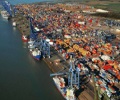

Hapag-Lloyd AG, the German international shipping and container transportation agency has announced it has ordered 75,000TEU containers, which will be manufactured in China and delivered within the fourth quarter of 2021.
This announcement comes almost three months after the company’s latest container order of 60,000TEU in May. Adding up all investments into containers since the beginning of 2020, Hapag-Lloyd has ordered 625,000TEU.
The order aims to ease the scarcity of empty containers causing provision bottlenecks, disrupting shipping, and causing further shocks to the global economy.
“While the normal turnaround time for our containers lies at 50 days, we currently need up to 60 days and more due to massive congestion at ports, terminals and inland operations worldwide,” said CEO of Hapag-Lloyd, Rolf Habben Jansen.
“This means that today about 20% more containers are bound in shipment while transporting the same amount of cargo before the crisis. With our recent container orders, Hapag-Lloyd is further contributing to ease the challenging situation for our customers worldwide.”
Hapag-Lloyd has a container inventory of more than 2.8 million TEU, among them 250,000 TEU reefer containers for refrigerated cargo.
The situation is so serious with factories facing shortages of inputs, energy and more expensive raw materials, and freights are a record highs, with some exporters forced to raise prices or simply cancelling shipments.
Likewise with activity in ports, and a clear example was what happened at China, with Ningbo, the third busiest in the world, which paralyzed some terminals because a positive tested case of the Delta variant. However the queues of vessels was so long and, some threatening to leave, that it was rapidly reopened. In 2020 some 1,2 billion tons of merchandise operated through the port. The terminal temporarily closed manages 10 million containers.
World maritime transport was negatively impacted by the sanitary restrictions imposed by the pandemic and was under severe pressure with the reactivation of economies.
Source: MercoPress